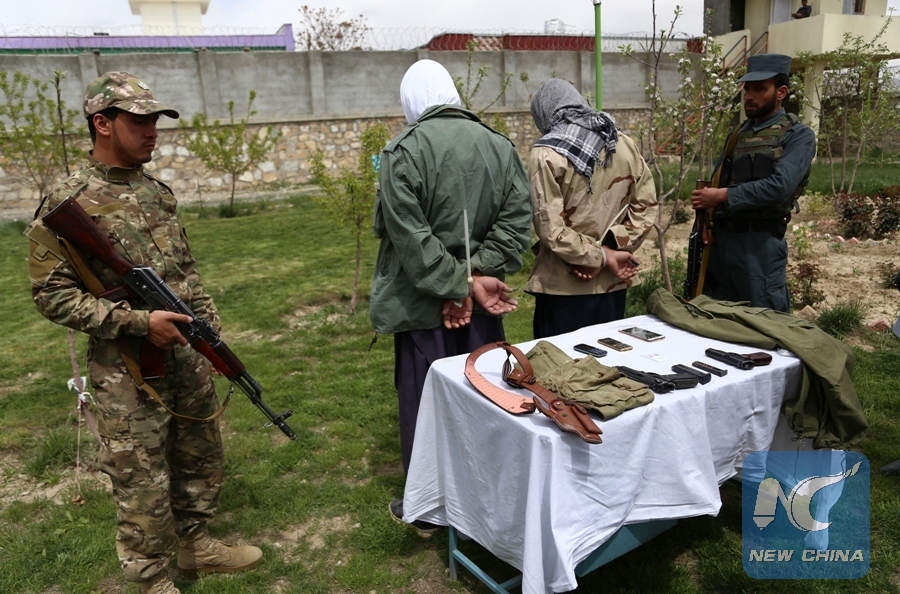
File Photo: Suspected Taliban militants stand handcuffed after being arrested in Ghazni city, capital of Ghazni province, Afghanstan, April 10, 2018. Afghan security personnel captured two suspected Taliban militants during a military operation in Ghazni province, eastern Afghanistan, a local official said. (Xinhua/Sayed Mominzadah)
UNITED NATIONS, June 26 (Xinhua) -- Speakers attending a UN Security Council meeting on the situation in Afghanistan said Tuesday that there were unprecedented opportunities for Afghanistan to seek peace and consolidate its political foundation.
Tadamichi Yamamoto, who is the special representative of the UN secretary-general and also head of the United Nations Assistance Mission in Afghanistan (UNAMA), presented the secretary-general's latest report, describing "extraordinary" events that spoke to possibilities and enduring structural obstacles.
Among them was Afghan President Asraf Ghani's June 7 declaration of a unilateral ceasefire from June 12 to 19, echoed days later by the Taliban with its own ceasefire from June 15 to 17.
The three overlapping days of calm marked the first time in 17 years that both sides had honored their truce, he said.
While the Taliban has not accepted the president's proposal to extend the truce, the offer for peace talks without preconditions has created a new reality in which Afghans in 20 of the country's 34 provinces are protesting for peace, 2,000 religious scholars have declared that suicide bombings are against the teachings of Islam and there was a 500-km march from Helmand to Kabul to demand an end to the conflict.
"The Afghan people's genuine demand for peace, coming from the bottom of their hearts, must not be ignored," he said.
With preparations under way for parliamentary elections in October, and presidential elections next spring, 7 million people had registered to vote since mid-April, marking the first time since 2003 that a complete voter registration would be carried out for the two polls.
The evolving development needs and the strategies to address them are being re-evaluated ahead of the Ministerial Conference on Afghanistan on Nov. 28.
Despite some positive progress, problems, old and new, could be found in this war-torn country.
Yury Fedotov, the executive director of the United Nations Office on Drugs and Crime (UNODC), said global opium production was up 65 percent in 2017, reaching 10,500 tons. Most of that product originated in Afghanistan.
Global attention had shifted away from counter-narcotics. "We cannot afford such inattention," he said, pressing the UN Security Council to keep the focus on that threat posed to Afghanistan, the region and beyond.
Vladimir Ivanovich Voronkov, the under-secretary-general of the United Nations Office of Counter-Terrorism, said deadly violence continued across Afghanistan, with 5,675 security incidents between Feb. 15 and May 15.
In two days, the secretary-general would host the first-ever High-level Conference of Heads of Counter-Terrorism Agencies, which will provide a platform for long-overdue discussion about how to boost global cooperation.
In the ensuing debate on Tuesday at the Security Council meeting, delegates stressed the importance of Afghan-owned, Afghan-led efforts to build a resilient country that could eventually provide for its own security needs, with the United States delegate urging the United Nations to ensure that UNAMA was fully staffed throughout the electoral period.

